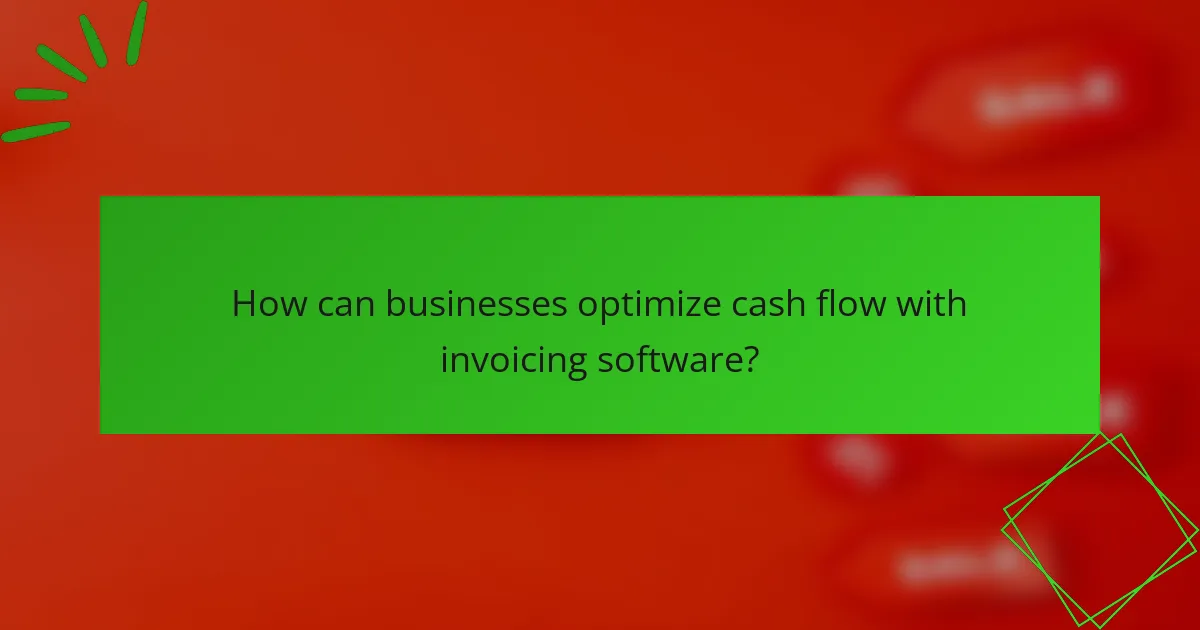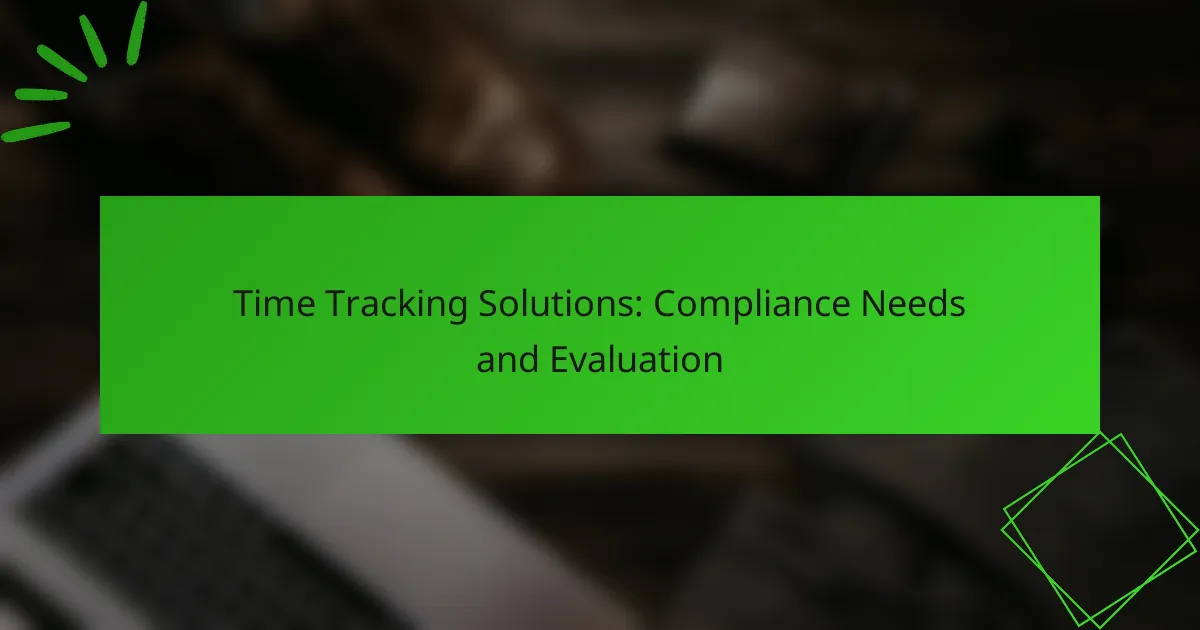Time tracking integration is a vital feature in invoicing software that streamlines the billing process by automating time records and enhancing visibility for clients. By reducing errors and discrepancies, this integration not only improves invoicing accuracy but also supports effective cash flow management, enabling businesses to align their billing with actual work completed.
![]()
How does time tracking integration improve invoicing software?
Time tracking integration enhances invoicing software by automating the billing process, ensuring accurate time records, and providing clear visibility for clients. This integration minimizes errors and discrepancies, leading to improved cash flow management.
Streamlined billing processes
Integrating time tracking with invoicing software automates the billing cycle, reducing manual input and the potential for errors. When time entries are directly linked to invoices, businesses can generate bills more quickly and efficiently, often in real-time.
This streamlined approach allows for faster payment cycles, as clients receive accurate invoices promptly. For example, a service provider can instantly bill a client for hours worked, rather than waiting until the end of the month to compile time sheets.
Accurate time allocation
Time tracking integration ensures that every minute worked is accounted for, leading to precise billing. By capturing time spent on specific tasks or projects, businesses can allocate costs accurately, which is crucial for profitability.
For instance, if a consultant tracks hours spent on different client projects, the invoicing software can generate detailed invoices that reflect actual work done. This accuracy helps avoid disputes and enhances trust between service providers and clients.
Enhanced client transparency
With integrated time tracking, clients gain visibility into the work being billed. Invoices can include detailed breakdowns of hours worked, tasks completed, and any relevant notes, fostering transparency in the billing process.
This level of detail not only builds trust but also helps clients understand the value of services rendered. For example, a client can see exactly how many hours were spent on a project, which can justify the costs and improve client satisfaction.
![]()
What are the best invoicing software options with time tracking?
The best invoicing software with time tracking integrates seamlessly to help businesses monitor billable hours and manage cash flow effectively. Key options include QuickBooks Online, FreshBooks, and Harvest, each offering unique features tailored to different business needs.
QuickBooks Online
QuickBooks Online is a popular choice for small to medium-sized businesses, providing robust time tracking capabilities alongside invoicing. Users can easily log hours worked on projects, which can then be converted into invoices with just a few clicks.
Consider its tiered pricing structure, which ranges from about $25 to $150 per month, depending on the features you need. QuickBooks also offers integration with various payment processors, enhancing cash flow management.
FreshBooks
FreshBooks is designed with freelancers and small businesses in mind, offering intuitive time tracking and invoicing features. Users can track time on tasks and generate invoices automatically, making it simple to bill clients accurately.
Pricing starts around $15 per month, with features that include expense tracking and project management tools. FreshBooks also provides excellent customer support, which can be beneficial for those new to invoicing software.
Harvest
Harvest focuses on time tracking and invoicing, making it ideal for service-based businesses. It allows users to track time spent on projects and create invoices based on those hours, streamlining the billing process.
Harvest’s pricing starts at about $12 per user per month, and it offers features like expense tracking and reporting. Its integration with other tools, such as project management software, can enhance overall efficiency in managing cash flow.
![]()
How does cash flow management benefit from time tracking?
Cash flow management greatly benefits from time tracking by providing accurate insights into labor costs and project timelines. This allows businesses to align their invoicing with actual work completed, ensuring timely payments and better financial health.
Improved financial forecasting
Time tracking enhances financial forecasting by offering data on how long projects take and the associated costs. By analyzing this information, businesses can predict future cash flow more accurately, adjusting budgets and resources accordingly.
For instance, if a company notices that a specific type of project consistently takes longer than expected, it can adjust its pricing or resource allocation to mitigate potential cash flow issues. Regularly reviewing time tracking data can lead to more informed financial decisions.
Real-time expense tracking
Real-time expense tracking through time tracking systems allows businesses to monitor costs as they occur. This immediate visibility helps in identifying any discrepancies or unexpected expenses that could impact cash flow.
For example, if a project is running over budget, managers can quickly assess the time logged against the budgeted hours and make necessary adjustments. Implementing alerts for when expenses exceed a certain threshold can also help maintain control over cash flow.
![]()
What features should you look for in time tracking integration?
When selecting a time tracking integration for invoicing software, focus on features that enhance efficiency and accuracy. Key aspects include automated time entries, robust reporting capabilities, and mobile accessibility to ensure seamless cash flow management.
Automated time entries
Automated time entries simplify the tracking process by recording hours worked without manual input. This feature reduces errors and saves time, allowing you to focus on more critical tasks. Look for integrations that capture time automatically based on user activity or predefined schedules.
For example, some tools can track time spent on specific projects or tasks directly from your computer or mobile device. This ensures that every minute is accounted for, which is essential for accurate invoicing and cash flow management.
Reporting capabilities
Effective reporting capabilities provide insights into how time is allocated across projects and clients. This feature helps identify trends, assess productivity, and make informed decisions about resource allocation. Choose an integration that offers customizable reports to fit your specific needs.
Consider tools that allow you to generate reports on billable versus non-billable hours, project profitability, and team performance. These insights can significantly impact your cash flow by highlighting areas for improvement or adjustment.
Mobile accessibility
Mobile accessibility is crucial for teams that work remotely or on the go. A time tracking integration with mobile capabilities allows users to log hours and manage tasks from their smartphones or tablets. This flexibility ensures that time is tracked accurately, regardless of location.
Look for apps that offer offline functionality, enabling users to record time even without internet access. This feature is particularly useful for freelancers or contractors who may not always have a reliable connection while working on-site.
![]()
What are the prerequisites for implementing time tracking integration?
To successfully implement time tracking integration, you need to ensure that your existing invoicing software is compatible and that your team is adequately trained. These prerequisites are essential for seamless integration and effective cash flow management.
Existing software compatibility
Before integrating time tracking, verify that your invoicing software supports this feature. Many popular platforms like QuickBooks, FreshBooks, and Xero offer built-in time tracking or can connect with third-party tools. Check the software documentation or support resources for compatibility details.
Consider the technical requirements, such as API access and data synchronization capabilities. If your current software lacks these features, you may need to upgrade or switch to a more compatible solution to ensure smooth integration.
Team training requirements
Training your team on the new time tracking integration is crucial for maximizing its benefits. Ensure that all relevant staff understand how to use the time tracking features effectively, including logging hours and generating reports. This can be achieved through workshops, online tutorials, or one-on-one sessions.
Monitor the team’s adaptation to the new system and provide ongoing support. Regular check-ins can help identify any challenges they face, allowing you to address issues promptly and ensure that everyone is leveraging the integration to improve cash flow management.

How can businesses optimize cash flow with invoicing software?
Businesses can optimize cash flow by using invoicing software to streamline billing processes, ensuring timely payments and better financial management. By automating invoicing and tracking payments, companies can reduce delays and improve their cash flow position.
Setting payment reminders
Setting payment reminders is crucial for maintaining healthy cash flow. Invoicing software often includes features that allow businesses to automate reminders for upcoming and overdue payments, reducing the need for manual follow-ups.
These reminders can be customized based on the payment terms agreed upon with clients. For example, a business might set reminders to notify clients one week before a payment is due and again three days after the due date if payment has not been received.
To effectively use payment reminders, ensure they are polite yet firm. A simple checklist for reminders could include: setting initial reminders, customizing the message for different clients, and tracking the effectiveness of reminders to adjust strategies as needed.









